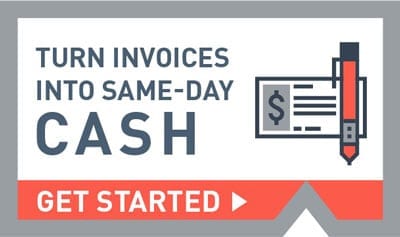Unlock Trapped Cash with Accounts-Receivable Financing
Accounts-receivable financing, also known as invoice factoring, is a financing solution that unlocks trapped cash flow that is tied up in your receivables.
Our Charleston factoring company programs work by selling your invoices to us in exchange for same-day cash. We offers some of the highest advances among factoring companies in Charleston and the United States.
 We’ll provide you up to 95 percent of your invoice amount the day we receive them.
We’ll provide you up to 95 percent of your invoice amount the day we receive them.
While we wait to get paid from your customer, you’ll have the cash needed to meet payroll, catch-up on bills and invest in new resources.
Once your customer pays the invoice 30 to 90-plus days later, we’ll remit the remaining percent, minus a small fee for our services.
While some companies turn to business loans or lines of credit, it isn’t always an available option or a quick enough option. Even if you’re approved, it can take months to get the cash you need. With our Charleston accounts-receivable financing programs, we’ll get you approved in as little as 15 minutes, and the cash in your pocket within 24 hours.
Industries
Many business to business industries suffer from slow-paying customers, making it challenging to manage your cash flow. We’ll provide you with a steady stream of cash through our invoice factoring programs.
Some of the industries we’ve funded include:
- Staffing Agencies
- Manufacturing
- Transportation
- Heavy Construction
- Renewable Energy
- Utility & Pipeline
- Telecommunications
- Technology
- Many More
Maintain & Grow Your Business with Invoice Factoring
When you need cash to meet payroll, pay bills and invest in new resources, use our Charleston invoice factoring programs. No matter your business size or situation, we can fund you.
We provide a cash-flow solution to companies who are:
- Waiting to get paid
- In need of quick cash
- Growing
- Starting-Up
- Turned down by a bank
- Filing bankruptcy
- Unable to get more capital because of maxed-out credit or less-than-perfect credit
Charleston, West Virginia
Located about 250 miles west of Washington, D.C., at the intersection of the Elk and Kanawha rivers, Charleston is the largest city in West Virginia. Since Charleston is also the capital of West Virginia, many residents refer to it simply as “Capital City.”
History
Some of the earliest inhabitants of present day Charleston were the Adena, a Native American mound-building tribe. European land surveyors came to the area in the mid-1760s, but they didn’t establish a permanent settlement. In 1787, Colonel George Clendenin purchased the land and built Fort Lee shortly after to protect the Kanawha Valley from Native American raiding parties. The population quickly increased after the fort was built and the town was officially incorporated in 1794 as Charles Town, in honor of Col. Clendenin’s father. In 1818, the name was shortened to Charleston to distinguish it from another town in the region with the name Charles Town. The discovery of salt brines in the region put Charleston on the map as a major salt manufacturing center and they began to ship salt around the country. The Civil War was particularly difficult in Charleston, as its residents were divided in their beliefs. In 1861, Virginia joined the Confederacy, but the majority of the western part of the state was loyal to the Union, which led to the creation of the state of West Virginia. Charleston became the capital of the new state in 1870.
Historically, Charleston has been an important source for coal, but the coal industry has taken a sharp decline in recent years. Luckily, as coal has decreased, the discovery of natural gas in the Marcellus Shale has caused natural gas to take its place. In fact, over the past four years the output of natural gas in West Virginia has increased by at least 35 percent every year. One research study suggests that the GDP from natural gas in West Virginia will soon be equal to that of coal.
Chemicals
Attracted to the area in the early 1900s, because of its easy access to a variety of natural resources, including salt, the chemical industry has been a major part of Charleston’s economy for the past century. West Virginia, and Charleston in particular, has the highest concentration of chemical producers in the world. Charleston is part of what is known as Chemical Valley, because of the large amount of chemical manufacturers in the area. One of the largest chemical companies in Charleston is Dow Chemical, which employs over 400 people. The Dow Chemical facility in Charleston produces more than 500 chemicals and plastics and acts as a redistribution factory for their other locations. In addition to a chemical manufacturing plant, Dow Chemical operates the South Charleston Technology Park, an open center for research, development and engineering for petrochemicals and plastics.
Manufacturing
Charleston is home to a variety of manufacturing companies, including Toyota Motor Manufacturing. Toyota Motor Manufacturing is one of the largest employers in Charleston, supporting 1,600 jobs. The company has operated a factory just outside of Charleston for twenty years and it has gone through eight expansions during that time. Currently, the Toyota Motor Manufacturing plant in Charleston is the only Toyota plant in North America that produces both engines and transmissions. Additionally, the company recently announced plans to make a $400 million investment to modernize the facility and add additional manufacturing capacity. This will add additional jobs to their already extensive workforce and is evidence of their commitment to the future of the Charleston plant.
Government and Health Care
As the capital of the state, the government supplies a significant amount of jobs to the workforce. In fact, the local and state government are the two largest employers in the city. Together they employ approximately 25,000 people. The federal government is also a large employer in the region, employing about 2,600 people. In addition to government, there is a substantial military presence, as Charleston is home to the 130th Airlift Wing of the West Virginia Air National Guard. The 130th Airlift Wing unit has about 1,100 personnel and recently invested $41 million into a new state of the art aircraft maintenance complex.
With an older population, Charleston also has a large health care industry. One of the major employers in the region is Charleston Area Medical Center, which employs over 6,800 people. The Charleston Area Medical Center has a significant impact on the economy of the region, with a combined direct and indirect impact of over $1.5 billion annually.
COMMON QUESTIONS
